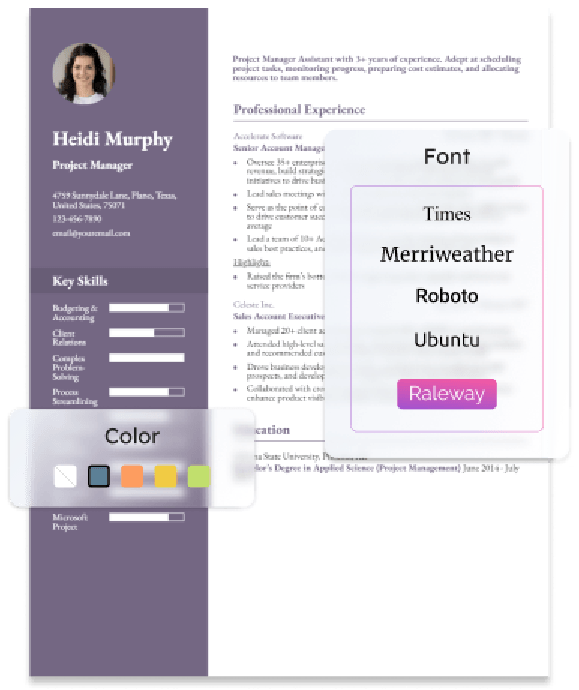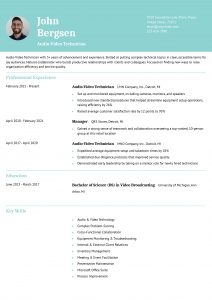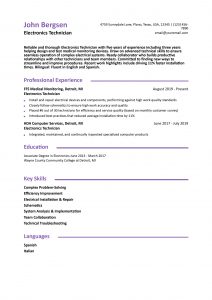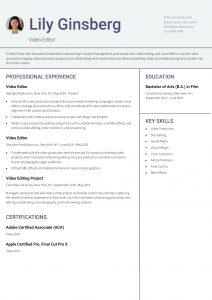A good audio engineer resume focuses on your relevant skills like equipment maintenance, project management, or sound mixing and mastering. Give examples of your past success as an audio engineer or in similar roles, and show your knowledge base by citing any training or certificate programs you’ve done. This guide provides expert tips to help you create a results-driven resume showing your best audio engineer qualifications.
Audio Engineer Resume Templates and Examples (Download in App)
Audio Engineer Resume Example
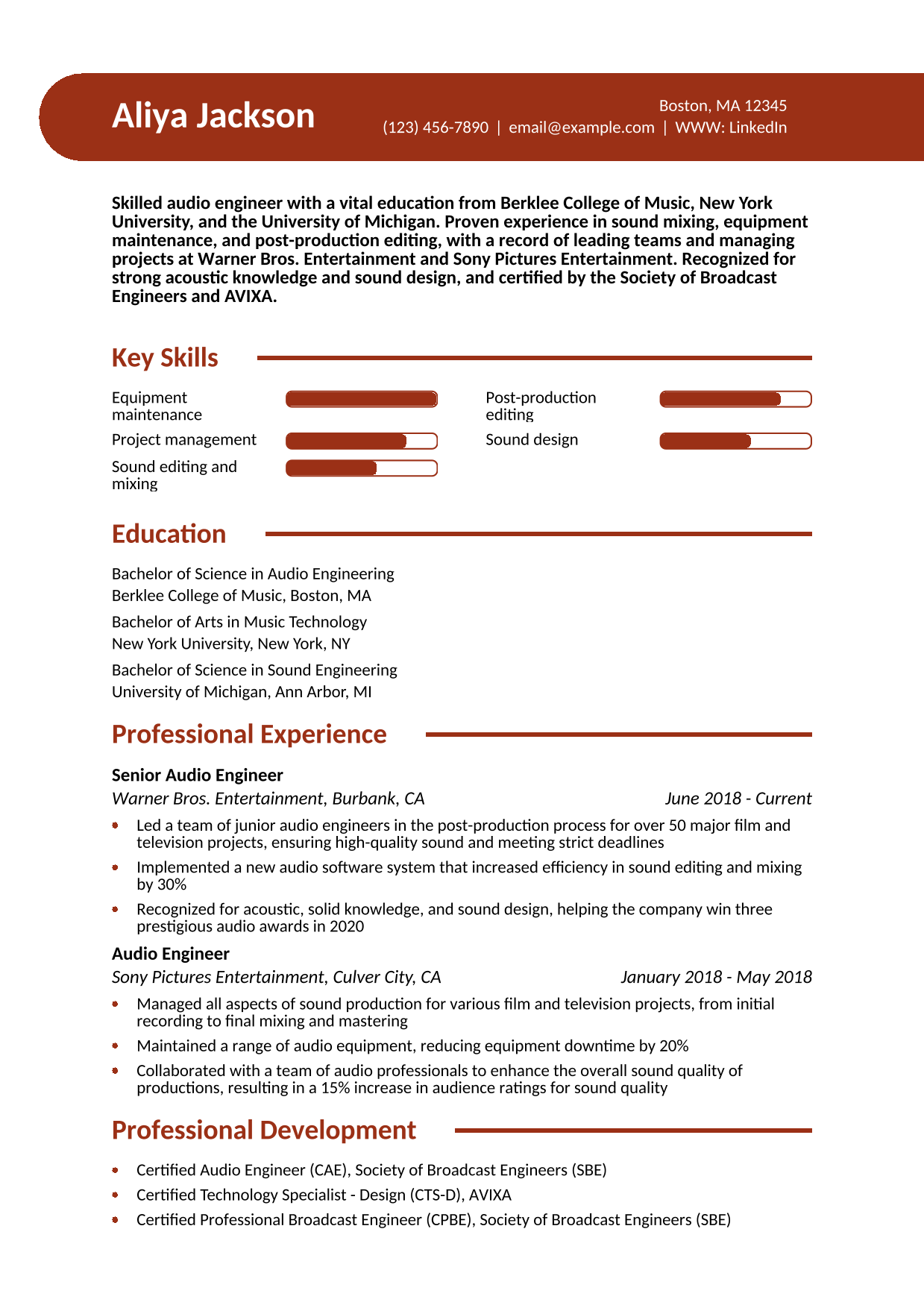
Why this audio engineer resume example is strong:
This resume has a prominent skills section showing how the job seeker can add value to an organization.
Entry-Level Audio Engineer Resume Example
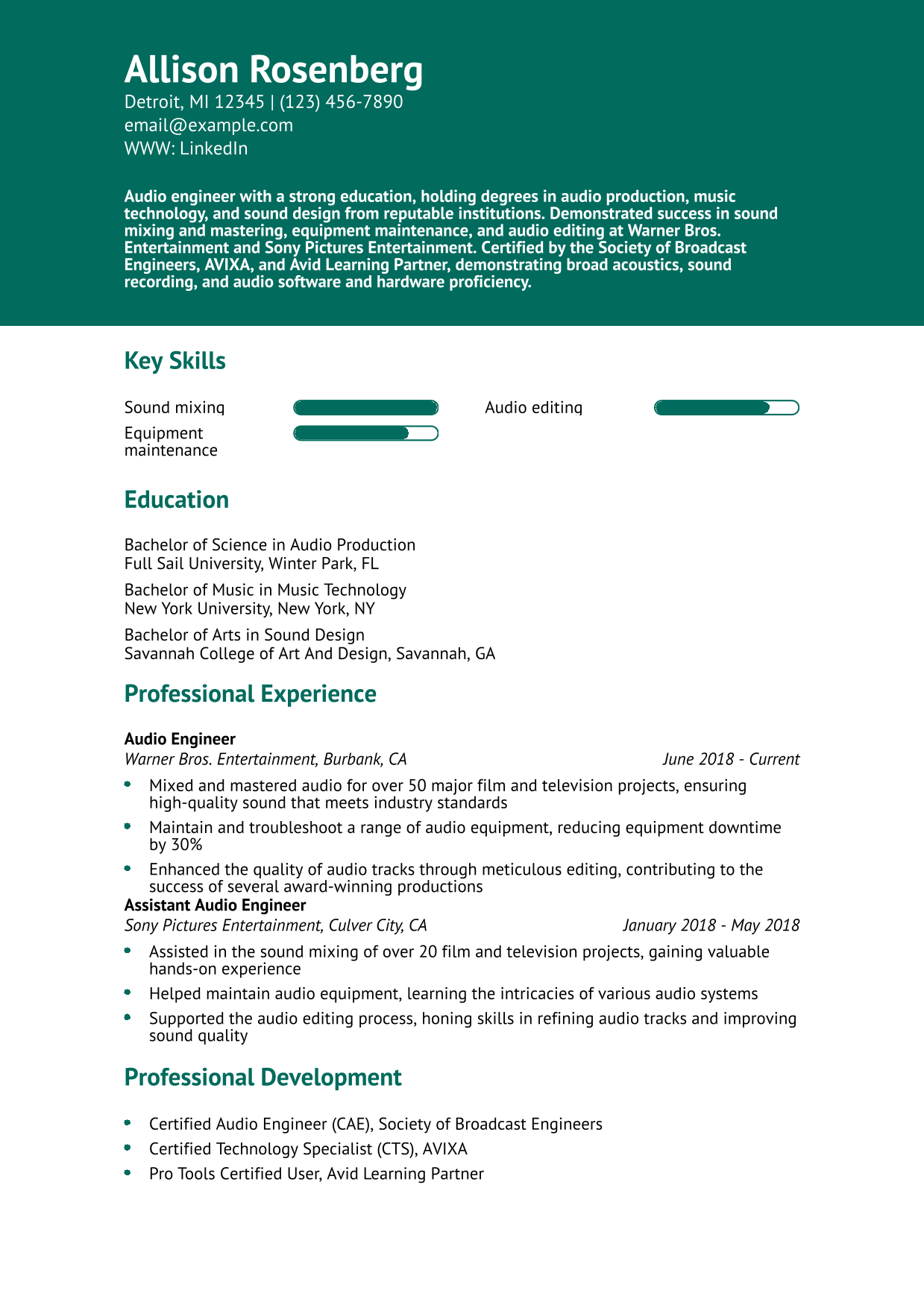
Why this audio engineer resume example is strong:
The experience section of this resume contains impressive numbers and data, showing how the candidate positively impacted their current and previous roles.
Freelance Audio Engineer Resume Example
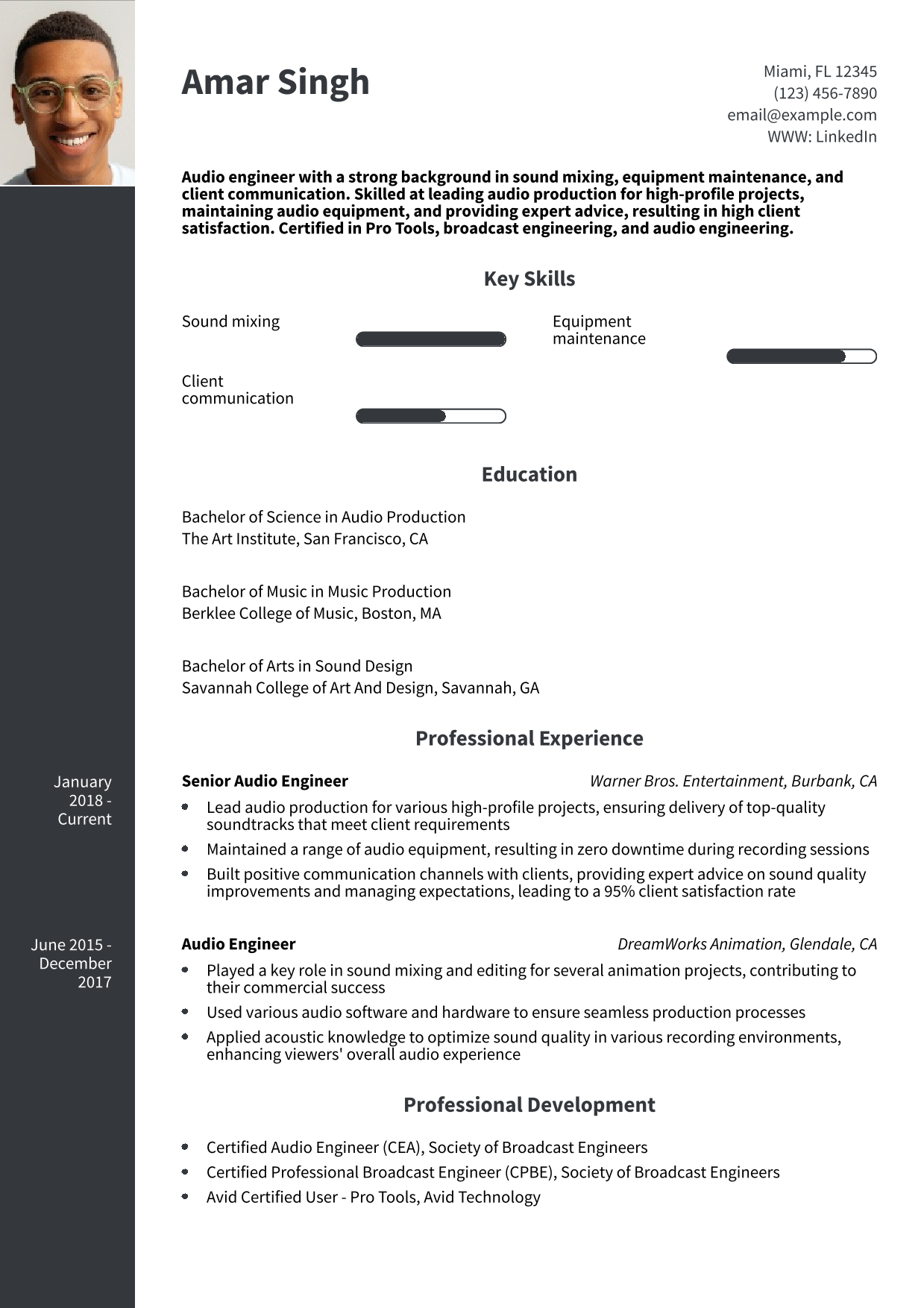
Why this audio engineer resume example is strong:
This resume uses dynamic verbs like "built" and "enhancing" to help express how the applicant has generated powerful results at each organization.
Live Audio Engineer Resume Example
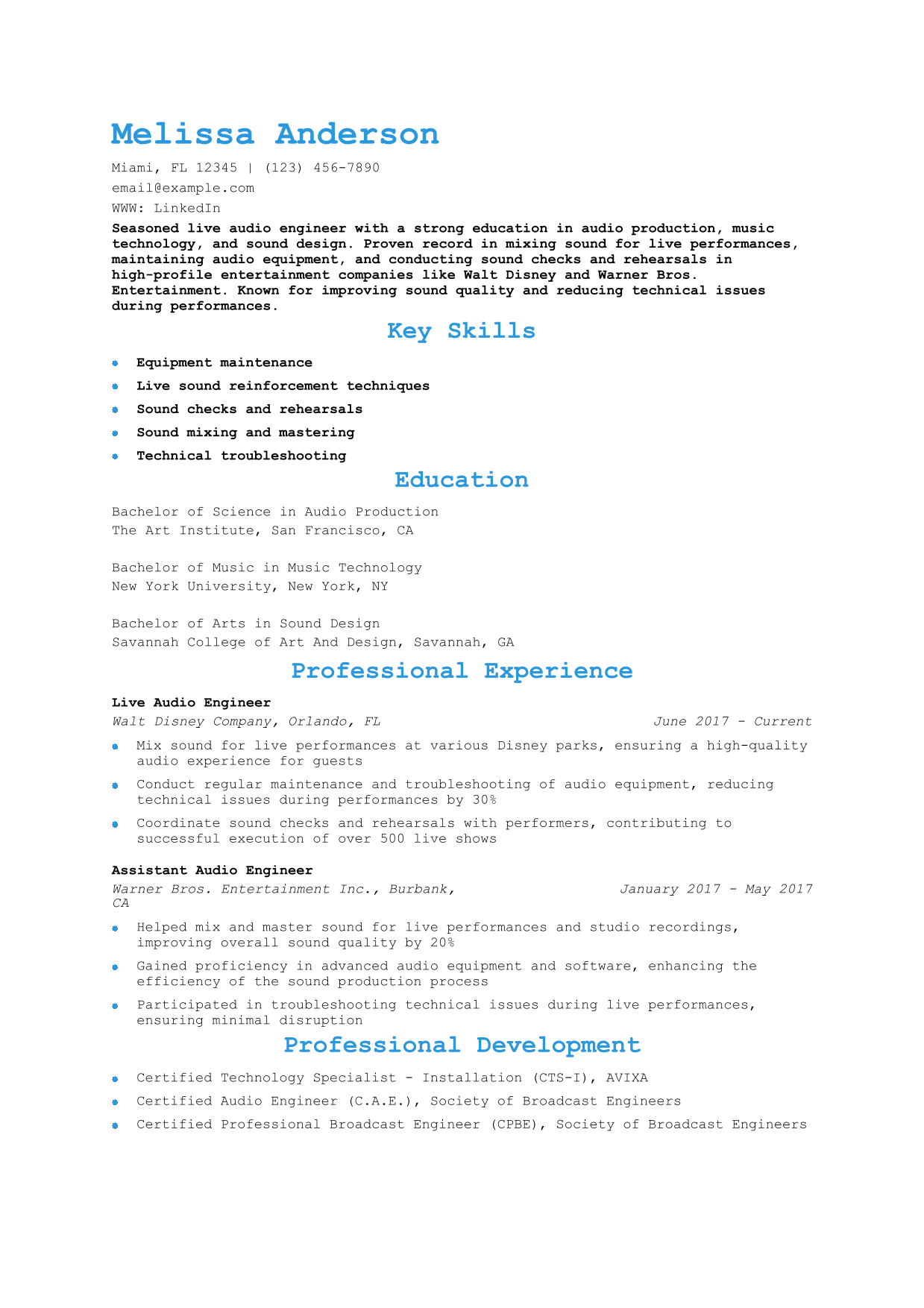
Why this audio engineer resume example is strong:
This resume follows a consistent structure and format to ensure hiring managers can read it easily. The job seeker arranges basic details consistently (title, organization, location, and dates where applicable), letting the reader quickly scan their career progress.
Audio Video Technician Resume Example
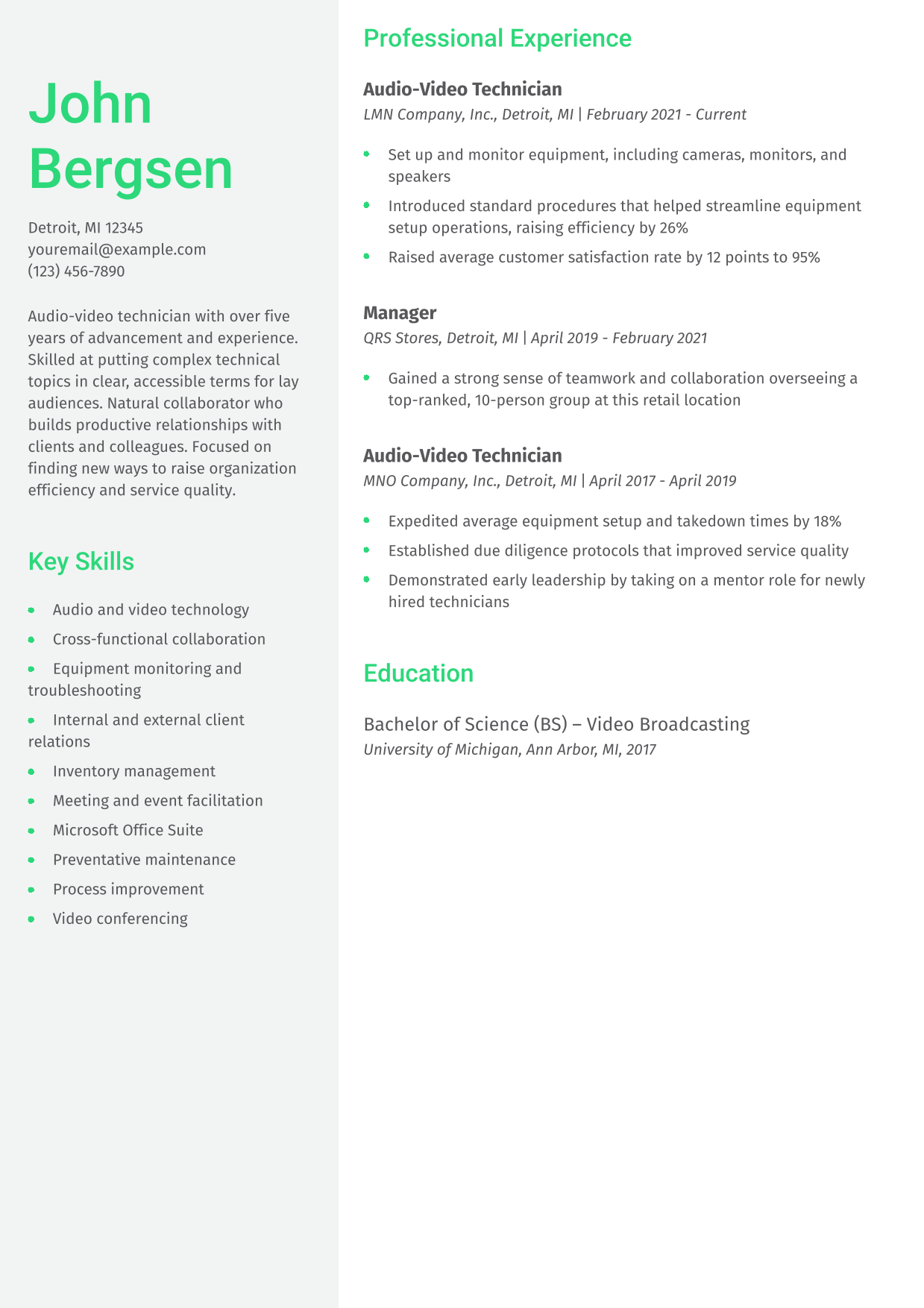
Why this resume example is strong:
John has positioned himself for his desired role by emphasizing his technician duties (and downplaying his time as a store manager). Take a similar approach when writing your resume's experience section. Give more information about your more relevant positions, even if you only held them briefly. Far from being misleading, this method gives hiring managers the most accurate measure of their work related to the role they hope to fill.
Electronics Technician Resume Example
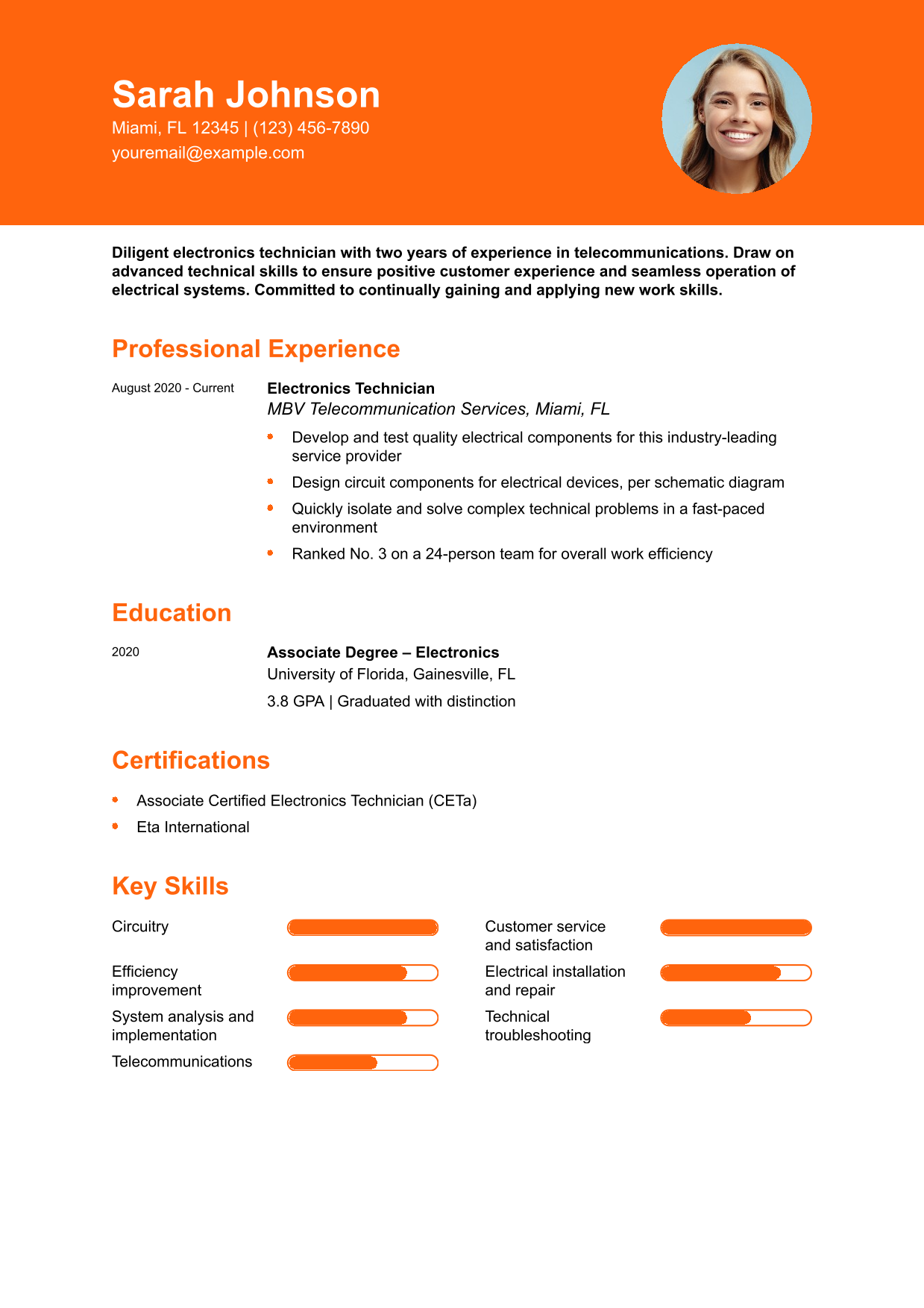
Why this resume example is strong:
Sarah introduces herself in the clear, direct tone recommended for resumes, with profile phrases like "diligent" and "committed to." Use simple phrases like these when writing your profile. Avoid flowery language and overly self-promoting terms like "excellent," "remarkable," or "outstanding at." A good rule of thumb: Only write phrases you can see yourself saying out loud at an interview or job fair.
Video Editor Resume Example
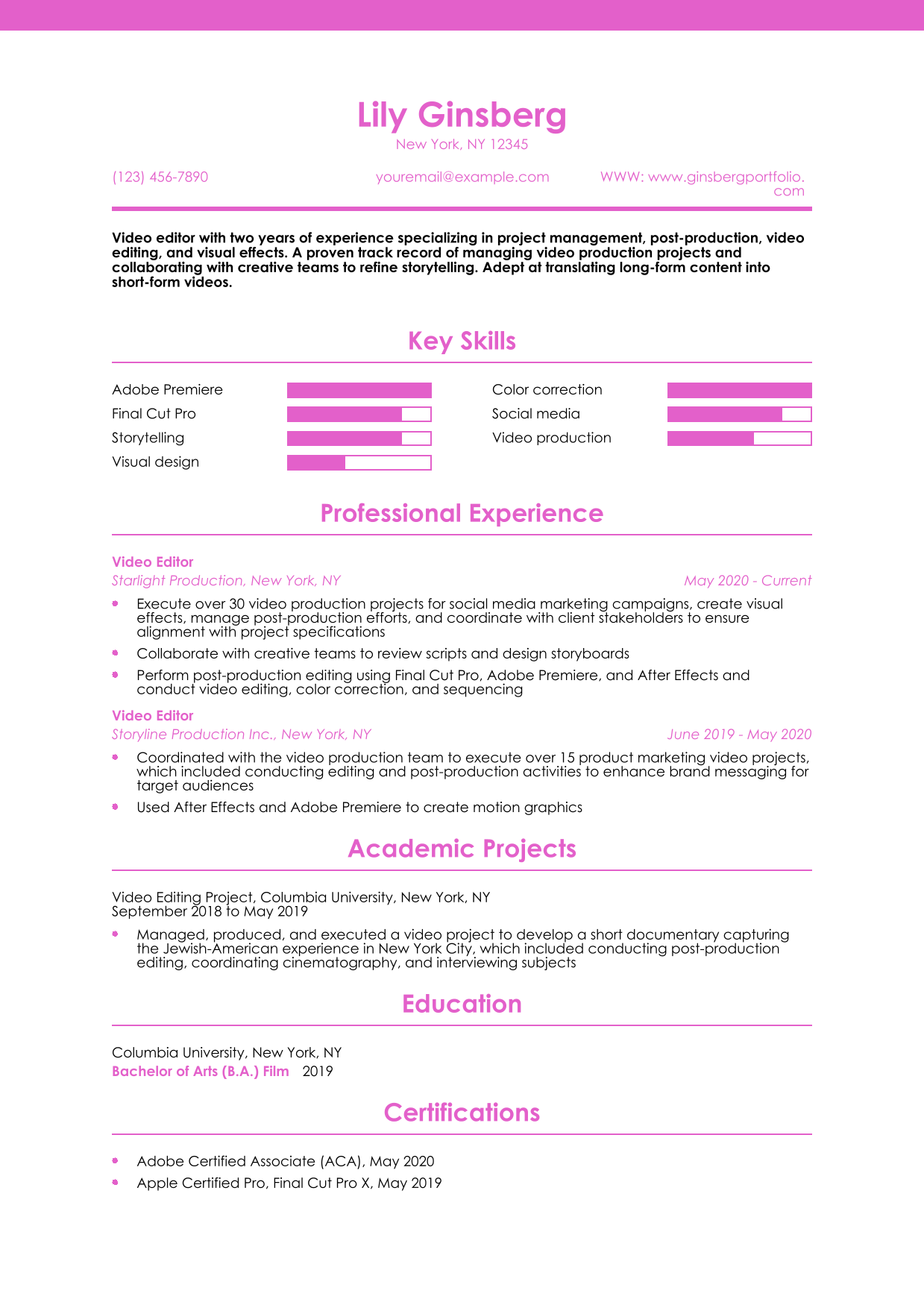
Why this resume is strong:
Lily has captured the scope of her relevant background and expertise by creating distinct sections for her skills, certifications, and academic projects.
Our templates are crafted by professional resume writers to make creating your resume quick, easy, and effective.
- Professional resume template downloads
- Customized cover letter generation
- AI resume writing support
- Career-building resources and advice
Audio Engineer Text-Only Resume Templates and Examples
How To Write an Audio Engineer Resume
1. Build a concise profile to present your audio engineer experience
In a brief paragraph at the top of your resume, catch hiring managers’ attention by giving the three to five main reasons you’ll excel as their next audio engineer. (Note: most job seekers find it easier to write their profile last.)
Example
Skilled audio engineer with a strong education from Berklee College of Music, New York University, and the University of Michigan. Proven experience in sound mixing, equipment maintenance, and post-production editing, with a record of leading teams and managing projects at Warner Bros. Entertainment and Sony Pictures Entertainment. Recognized for strong acoustic knowledge and sound design and certified by the Society of Broadcast Engineers and AVIXA.
2. Develop an audio engineer professional experience section centered on your accomplishments
Use your resume’s experience section to give examples of your background and success in your target role. For each job in your recent work history, brainstorm your duties and achievements on a separate document or sheet of paper. Then, choose the most relevant ones to include as bullet points on your resume. With this approach, you can write a detailed and focused experience section.
Example
Audio Engineer, Warner Bros. Entertainment, Burbank, CA | June 2018 to present
- Mixed and mastered audio for over 50 major film and television projects, ensuring high-quality sound that meets industry standards
- Maintain and troubleshoot a range of audio equipment, reducing equipment downtime by 30%
- Enhanced the quality of audio tracks through meticulous editing, contributing to the success of several award-winning productions
3. Include education and certifications that enhance your audio engineer credentials
Give the basics on any bachelor’s degree(s) you’ve completed or worked toward. Then, flesh out this section with any certifications or other details that help show your relevant knowledge base.
Below are templates and examples to help you format your education and certification details. Note optional template areas appear in [brackets].
Education
Template
- [Candidate:] Degree Name — [Major, Minor], School Name, City, ST or online | [Year]
- [Relevant honors, activities, or coursework]
Example
- Bachelor of Science — Audio Production, The Art Institute, San Francisco, CA
Certifications
Template
- Certification Name or Title, [Awarding Organization] | [Year]
- [Description]
Example
- Certified Audio Engineer (CEA), Society of Broadcast Engineers
4. List the core key skills that support your audio engineer abilities
Add a key skills section to show how you can contribute to your target job. Below are some common capabilities and keywords for audio engineer resumes:
| Key Skills and Proficiencies | |
|---|---|
| Audio editing | Client communication |
| Equipment maintenance | Live sound reinforcement techniques |
| Post-production editing | Project management |
| Sound checks and rehearsals | Sound design |
| Sound mixing and mastering | Technical troubleshooting |
How To Pick the Best Audio Engineer Resume Template
As with most vocations, audio engineers should use a straightforward resume template. Opt for a layout that lets the hiring manager quickly review your best career details. Select a traditional resume font, and avoid any template with a colorful or elaborate design. Also, ensure the template complies with applicant tracking systems (ATS) employers use to screen resumes.
Frequently Asked Questions: Audio Engineer Resume Examples and Advice
What should I avoid when writing my Audio Engineer CV to ensure it's professional and impactful?-
To ensure your Audio Engineer CV stands out, avoid using generic terms or vague language. Focus on specific achievements with numbers and data that demonstrate your real-world impact. Also, be cautious of overloading the document with too much text or irrelevant information—keep it focused on your most relevant skills and experience.
What are common action verbs for audio engineer resumes?-
It's easy to get stuck when writing the experience section of a resume. You might need action verbs to describe your work. To help you with this challenge, we compiled the joint action verbs below that describe audio engineer roles..
| Action Verbs | |
|---|---|
| Clarified | Configured |
| Created | Decreased |
| Developed | Enhanced |
| Fostered | Generated |
| Grew | Increased |
| Introduced | Ranked |
| Reduced | Streamlined |
| Updated | Won |
How do you align your resume with an audio engineer job posting?-
One great way to customize your resume is by adding brief descriptions of the places you've worked in [brackets] right next to or below the company name. Company descriptions let you show any similarities between your past employers and the one who posted the job.
For example, you've worked for companies of a similar size or industry. Or you've worked at organizations with a similar mission or leadership philosophy. By adding these kinds of details, you can make your resume more relevant to the job opening.
What is the best audio engineer resume format?-
Most audio engineers should use the combination (or hybrid) format. True to its name, this format combines two essential features of other resume formats: the chronological format's experience section and the functional format's profile section. (The resume examples on this page all use combination format.)
A combination resume offers the best of both worlds by fusing these features. The experience section lets you outline your recent work history – essential information for most employers. At the same time, the profile section enables you to display your career highlights at the top, regardless of whether they're from that work history or another part of your background.
As a result, you can present yourself clearly and strategically. This format gives hiring managers the best view of your experience and relevant strengths so they can decide whether to call you for an interview.
Should my audio engineer resume be one or two pages?-
Your audio engineer resume should ideally be one page, especially if you have fewer than 10 years of experience. A two-page resume can be effective for seasoned professionals with a longer track record if it highlights accomplishments and skills directly relevant to the job. Every detail should add value and strengthen your candidacy.
Limit your work experience to the past 10 to 15 years, unless earlier positions are highly relevant. Keeping your resume concise and targeted will make a strong and memorable impression on potential employers.

To increase your chances of an interview, write and submit a strong cover letter. The key to a good cover letter is tailoring it to each job opening. Read our cover letter guide to learn how. For more tips and examples, see our electrical engineer cover letter guide.
Craft your perfect resume in minutes
Get 2x more interviews with Resume Builder. Access Pro Plan features for a limited time!



